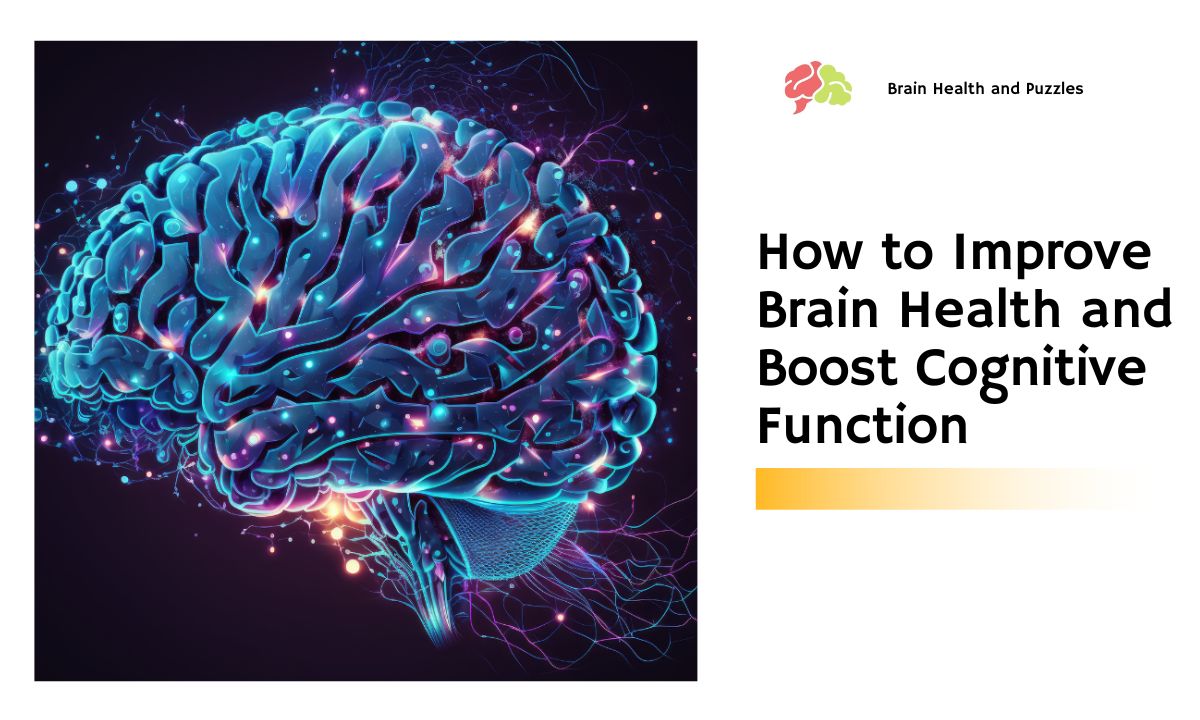How to Improve Brain Health and Boost Cognitive Function

In our fast-paced lives, maintaining optimal brain health is a priority for many. The good news is that there are actionable steps you can take to enhance cognitive function and promote overall brain well-being. In this article, we’ll explore effective strategies to unlock the secrets of a sharper mind and improved brain health.
1. Nutrient-Rich Diet: Fuel for the Brain
The foundation for a healthy brain starts with what you eat. A nutrient-rich diet provides essential vitamins, minerals, and antioxidants crucial for cognitive function. Focus on incorporating:
- Omega-3 Fatty Acids: Found in fatty fish, flaxseeds, and walnuts, these fats support brain structure and function.
- Antioxidant-Rich Foods: Berries, dark chocolate, and leafy greens help combat oxidative stress, protecting brain cells.
- Vitamins: Ensure an adequate intake of B vitamins, vitamin C, vitamin D, and vitamin E for overall cognitive support.
2. Hydration: Water for Mental Clarity
Staying hydrated is often underestimated when it comes to cognitive health. Dehydration can impair concentration and attention. Make it a habit to:
- Drink Plenty of Water: Aim for at least eight glasses of water a day to support optimal brain function.
- Herbal Teas: Incorporate herbal teas like chamomile and green tea, known for their cognitive benefits.
3. Quality Sleep: The Brain’s Reset Button
Sleep is a critical factor in cognitive function and memory consolidation. Establishing good sleep hygiene involves:
- Consistent Sleep Schedule: Aim for 7-9 hours of sleep each night, going to bed and waking up at the same time.
- Create a Relaxing Environment: Minimize noise and light, and consider using blackout curtains for quality sleep.
4. Regular Exercise: Boosting Brain Power
Physical activity has profound effects on the brain. Exercise enhances blood flow, stimulates the release of chemicals that support cognitive function, and promotes neuroplasticity. Incorporate:
- Cardiovascular Exercise: Activities like walking, running, or cycling increase blood flow to the brain.
- Strength Training: Building muscle mass contributes to overall brain health.
5. Mental Stimulation: Exercise for the Mind
Keeping your brain engaged and challenged is crucial for cognitive function. Stimulate your mind through:
- Learning: Acquire new skills, take up a hobby, or engage in lifelong learning.
- Puzzles and Games: Crossword puzzles, Sudoku, and strategy games enhance cognitive abilities.
6. Stress Management: Protecting the Brain
Chronic stress can have detrimental effects on the brain. Implement stress management techniques:
- Mindfulness and Meditation: Practice mindfulness to reduce stress and improve focus.
- Deep Breathing: Incorporate deep breathing exercises to calm the nervous system.
7. Social Connection: Brain-Boosting Relationships
Human connection is vital for mental well-being. Cultivate and nurture meaningful relationships:
- Socialize Regularly: Spend time with friends and family, fostering positive connections.
- Join Clubs or Groups: Engage in activities that allow for social interaction and shared interests.
8. Limit Toxins: Protecting Brain Cells
Certain substances can harm the brain. Take steps to minimize exposure:
- Moderate Alcohol Consumption: Excessive alcohol can damage brain cells; moderation is key.
- Avoid Smoking: Smoking is linked to cognitive decline, so quitting or avoiding tobacco is crucial.
Conclusion
Improving brain health and cognitive function is a multifaceted endeavor that involves a holistic approach. By adopting a nutrient-rich diet, staying hydrated, prioritizing quality sleep, engaging in regular exercise, stimulating your mind, managing stress, fostering social connections, and minimizing toxins, you can unlock the secrets to a sharper and healthier brain.
FAQs
Q: Can specific foods instantly boost cognitive function?
A: While certain foods may provide immediate benefits, long-term cognitive health is best achieved through a balanced diet.
Q: How quickly can exercise impact cognitive function?
A: Regular exercise can lead to noticeable cognitive improvements within weeks, especially in areas like memory and attention.
Q: Is multitasking harmful to cognitive function?
A: Multitasking can reduce efficiency and hinder cognitive performance. Focusing on one task at a time is generally more effective.
Q: Are there specific sleep patterns that optimize cognitive function?
A: Consistent sleep patterns, such as going to bed and waking up at the same time, contribute to optimal cognitive function.
Q: Can socializing online have the same brain-boosting effects as in-person interactions?
A: While online connections can be valuable, in-person interactions often provide additional benefits for mental well-being.


